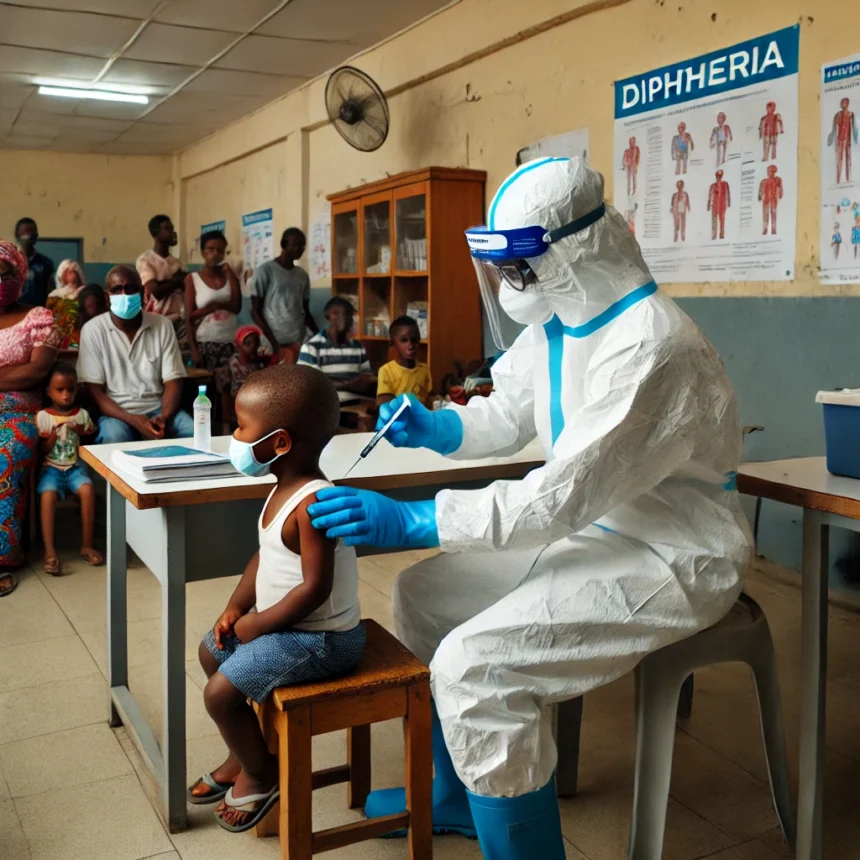Lagos, Nigeria, is currently undergoing a diphtheria outbreak, which is a highly contagious bacterial infection that can be fatal if not treated. Health officials are striving to contain the outbreak, but residents and the general public must stay informed. Understanding how diphtheria spreads, recognizing its signs, and knowing how to protect yourself can help limit infections and save lives.
MUST READ; Causes, Treatments, and Tips for Preventing Hair Loss in Men
What is Diphtheria?
Corynebacterium diphtheriae causes a bacterial infection known as diphtheria. It primarily affects the throat and nasal passages, causing respiratory problems and, in severe cases, complications involving the heart and brain system. A key feature of diphtheria is the growth of a thick, grayish membrane in the throat, which can restrict airways and cause trouble breathing. The condition is most harmful to children, the elderly, and those with compromised immune systems. Diphtheria, if not treated promptly, can cause serious complications such as paralysis, heart failure, and even death.
How does Diphtheria spread?
Diphtheria spreads mostly by respiratory droplets produced when an infected person coughs or sneezes. Bacteria can also spread through direct contact with contaminated surfaces, personal objects, or infected wounds. The risk of transmission increases dramatically while living in crowded or filthy surroundings. Given how rapidly HPV spreads, early detection and isolation of infected individuals are critical for preventing further outbreaks. People who have not got the diphtheria vaccine have the highest chance of developing the disease.
The symptoms of Diphtheria
Diphtheria symptoms usually occur two to five days after being exposed. Early symptoms include a scratchy throat, slight fever, and swollen glands in the neck. As the illness advances, a thick grey membrane may form on the throat and tonsils, causing breathing problems, hoarseness, and difficulty swallowing. Other symptoms may include weariness, a fast heartbeat, and, in severe cases, nerve damage and organ failure. Diphtheria can be lethal if not treated immediately, thus early intervention is crucial.
Who is at Risk?
Certain groups are more susceptible to diphtheria infection. Unvaccinated people are at the greatest danger, notably children under the age of five and elderly over the age of sixty. People who live in crowded or filthy areas, as well as those with compromised immune systems and poor hygiene habits, are also more vulnerable. Given these risk factors, immunization remains the most effective method of protecting oneself from diphtheria. Regular booster doses help to maintain long-term immunity.
Preventive Measures
1. Get vaccinated; The most effective strategy to avoid diphtheria is immunization. The diphtheria vaccine is typically administered in conjunction with the tetanus and pertussis vaccines. Children receive this vaccination as part of their usual immunization program, but adults should receive booster doses every ten years. If you or a member of your family has not received a booster shot in a while, schedule an appointment with a health care provider right away.
2. Maintain proper hygiene; Proper cleanliness can dramatically lower the risk of diphtheria infection. Wash your hands frequently with soap and water, especially after visiting public locations. Do not share personal belongings such as cups, towels, or dining utensils with others. When coughing or sneezing, always cover your mouth and nose to prevent germs from spreading. Disinfect regularly touched surfaces to kill bacteria and lower the chance of transmission.
3. Seek medical attention immediately; If you or someone you know is experiencing diphtheria symptoms, seek medical assistance right once. Early detection and treatment with antibiotics and diphtheria antitoxin can reduce serious consequences and enhance recovery results. Delaying treatment raises the possibility of catastrophic complications, such as respiratory failure and organ damage.
In conclusion, Diphtheria is a severe yet avoidable disease. The continuing outbreak in Lagos highlights the significance of vaccination and good cleanliness. We can protect ourselves and people around us by adopting preventive actions such as getting vaccines on time, maintaining proper hygiene, and seeking medical attention as soon as symptoms appear. If you haven’t gotten vaccinated in a while, go to your local health facility today. Encourage your family and friends to do the same. Raising awareness and taking proactive steps can assist to avoid future infections and save lives.


